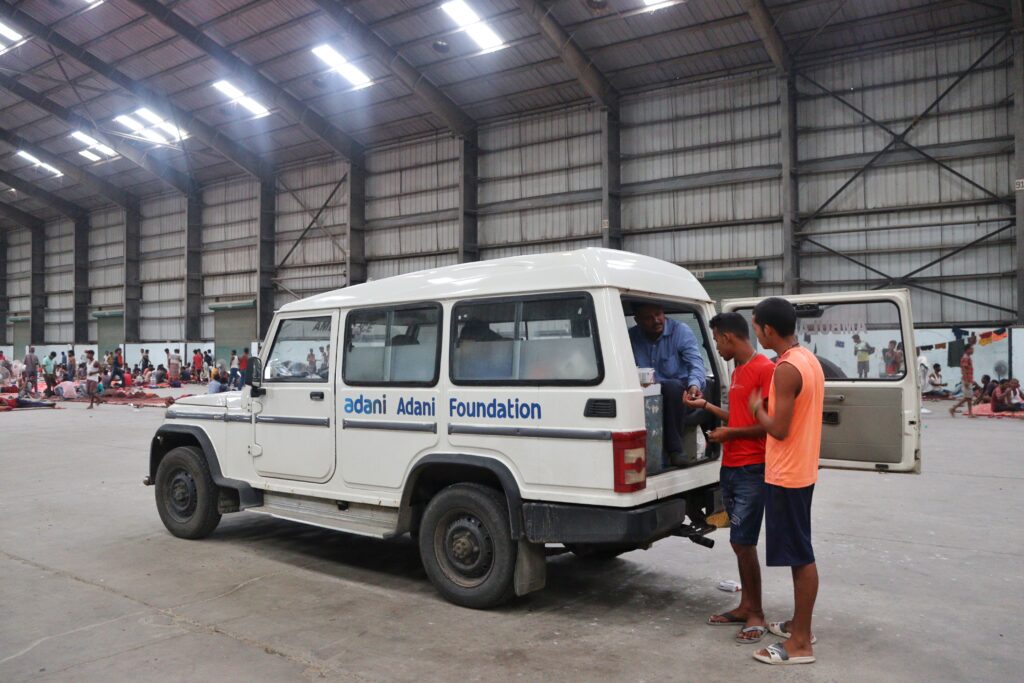Cyclone Biparjoy has caused widespread displacement and unrest in Gujarat’s Kutch district. It has caused extensive damage to crop, homes, and infrastructure, leaving thousands of people without shelter and in dire need of food, water and medical assistance. In the coastal town of Mundra, the Adani Foundation launched comprehensive disaster management and relief efforts in 22 affected villages.
To contribute to the preparedness as per the cyclone forecast, more than 4,500+ people were transferred to safe places and shelter houses. Stand-by ambulances, food packets and PPE kits were arranged from the very first day. A total of 4,500 food packets were distributed to everyone three times per day for three days. 1,200 fisherfolk families were provided ration kits in the coastal villages where they had migrated.
The estimated 50,000 kgs of dry grass needed for 16,017 cattle belonging to 2,747 pastoralists in 24 villages was arranged sent. These steps helped to minimize the adversities and achieve zero causality. Mr. Rakshit Shah, Executive Director of Adani Ports and Special Economic Zone, said, “In the wake of the cyclone, we feel a deep sense of responsibility to give back to the region that has given us so much. Despite facing numerous difficulties and disasters, the people of Kutch have always emerged stronger, paving the way for development and prosperity.”
The Adani Foundation has coordinated with local government authorities and relevant stakeholders to adopt a collaborative approach, sharing information, resources, and responsibilities to optimize relief efforts. The Foundation team members met with the director of Agricultural Technological Management Agency (ATMA), the animal health department, and the mamlatdar office to facilitate assistance where needed. It conducted a primary assessment of the core villages in collaboration with the district administration and village volunteers. The assessment revealed that over 80,000 trees were uprooted, and 30,000 date palms sustained damage.
To address the immediate needs of the affected population, the Adani Foundation is providing tarpaulin sheets for temporary housing, ensuring availability of food for flood-affected families and deploying excavators to clear access routes at the earliest. It opened 10 shelter houses in different villages, where more than 500 families (around 2,500 people) were accommodated.
The Adani Foundation team has established medical camps and mobile clinics to provide immediate healthcare support, ensuring an adequate supply of essential medicines and medical personnel to address injuries, illnesses, and potential disease outbreaks among the affected population. More than 300 persons have benefitted from the medical aid and counselling.
To address the issue of drinking water availability following the cyclone, residents were requested to fill up 200 rainwater harvesting tanks that had been previously installed by the Adani Foundation as part of its water conservation project. This has ensured a steady supply of drinking water. In other areas, the Adani Foundation has supplied water tankers, supporting over 2,000 families i.e., roughly 8,500 beneficiaries. Gujarat CSR Head Pankti Shah said, “The next steps will be to strengthen cattle care and fisherfolk settlements. We are working with the community and government to conserve the water that is now collected, conduct awareness campaigns, and preserve/revive date palms alongside the Horticulture Department. The Adani Foundation remains committed to supporting the agricultural sector and mitigating the damage caused.”

